5 new products at Dairy-Tech 2025 to improve efficiency
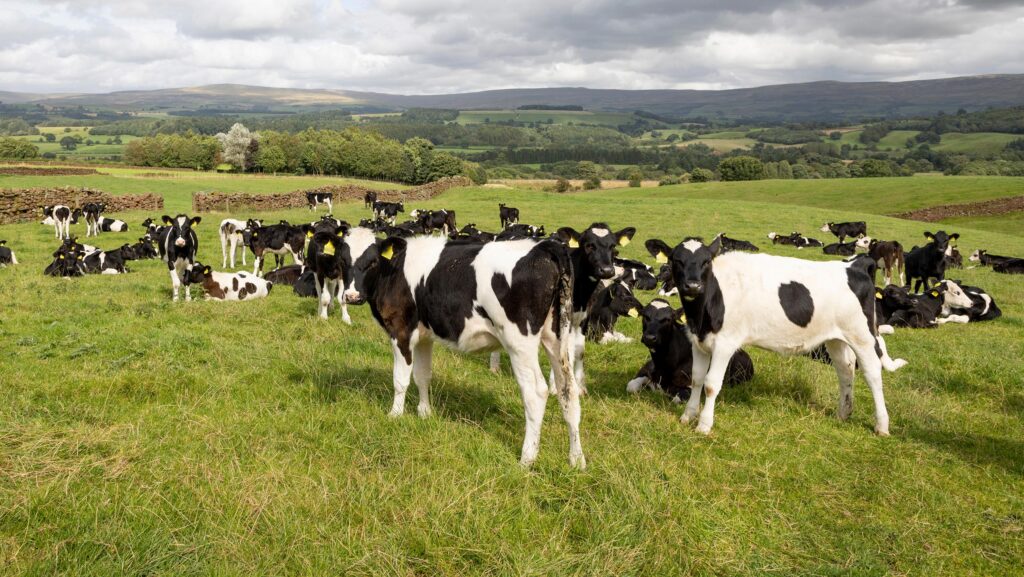 © Gary Naylor Photography
© Gary Naylor Photography In a precarious time for the industry, technology to enhance productivity has never been more important.
Here, we take a look at just a few of the new products that will be on offer at the event, to be held in Warwickshire on 5 February.
See also: 6 products at Dairy-Tech to improve efficiency
Dairy-Tech 2025
- When: Wednesday 5 February 2025, 8:00am-5:30pm
- Where: Stoneleigh Park, Warwickshire, CV8 2LZ
- Tickets: £20 pre-booked, £25 on the day. Under 16s free. Proof of age may be required. Buy online at dairy-tech.uk/visiting/buy-tickets
1. FeedStation Mobile
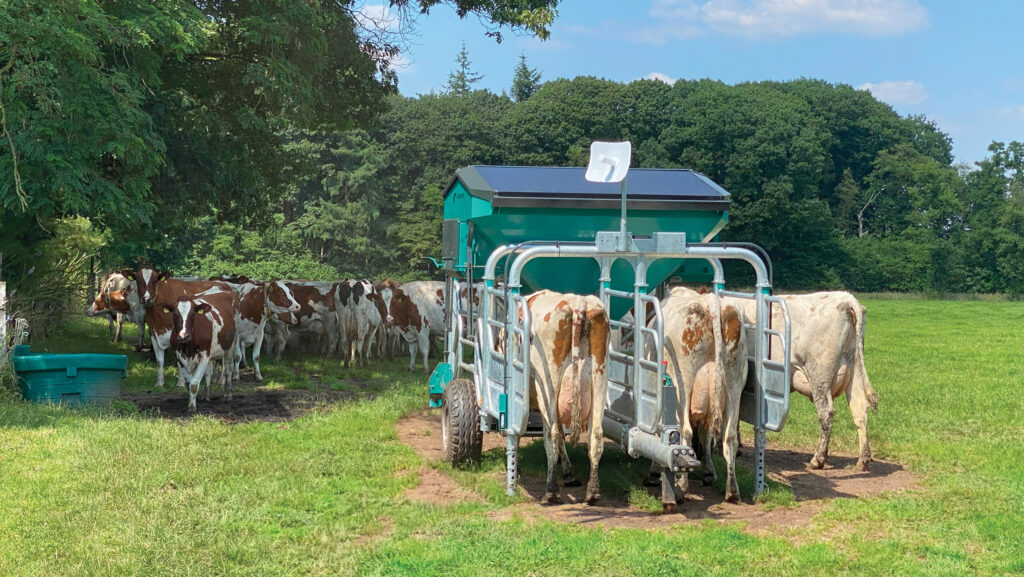
© Hanskamp
Hanskamp
New from Dutch firm Hanskamp is FeedStation Mobile – a system that enables farmers to feed pasture-based herds concentrates in the field.
While technology is already available for feeding at grass, the firm’s Armand Booij says what makes the Hanskamp system unique is the ability to feed cows individually.
The feed station is installed onto a rolling axle to make it easy to manoeuvre via tractor or 4×4, and is powered through integrated solar panels and batteries. It can also be used inside if required by plugging into mains electric.
In terms of capacity, each feed station comprises a 2,230-litre silo with space for two to four animals depending on the configuration – and the ability to dispense two different types of feed.
A single system, therefore, has the ability to feed up to 140 cows.
Hanskamp’s computer feeding system, Spider, can be accessed from smartphone, tablet or computer.
It can be set up to enable automatic feeding for indvidual cows (with identification via either ear tags or collars), which also makes it possible to track exactly how much each cow has eaten.
Price: List price for a two-space system is €26,000 (£21,446). Extra feed spaces can be added for an additional cost.
Contact: info@hanskamp.nl or hanskamp.com/en/find-a-dealer to find the nearest UK dealer.
2. Quantum lateral flow antibiotic tests
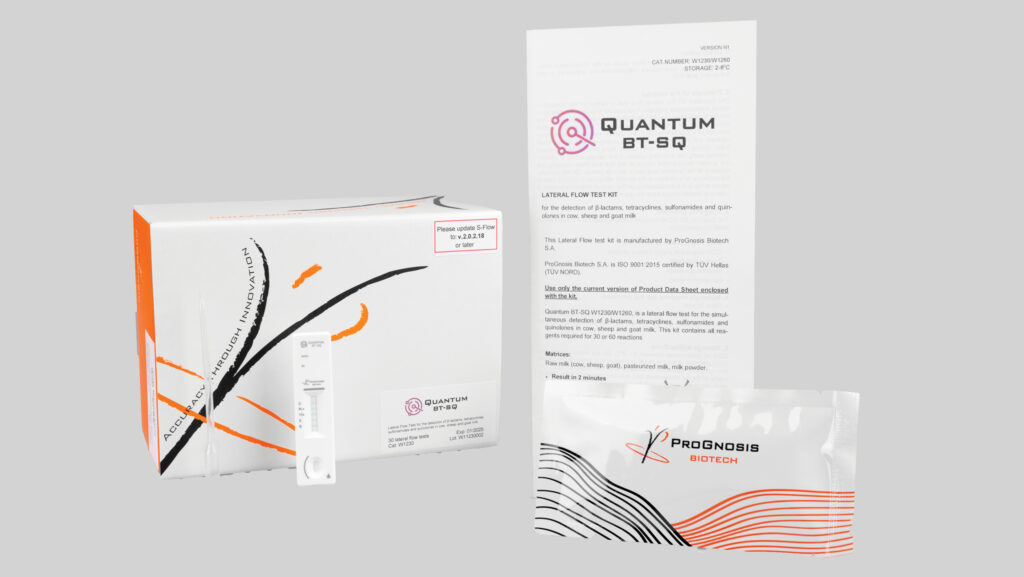
© ProGnosis-Biotech
ProGnosis Biotech
Testing for antibiotics residues with results in less than a minute will be possible through a new range of quantum lateral flow tests from ProGnosis Biotech.
In a bid to accelerate the speed at which farmers can test for antibiotics residues in milk, the firm’s Alan Deery says this quicker way of testing comes as a result of not needing to heat or incubate samples.
It works simply by adding three drops of milk straight from storage into the test, with a negative result available in as little as 60 seconds.
Alan says that the simplification of this process also means that testing would no longer have to be carried out by a trained member of staff.
Results from all tests are available via the S-Flow smartphone app, making them easy for anyone on farm to interpret, he says.
The full line-up in the new series includes:
- QuantumBL – detects β-lactams with negative results in 60 seconds
- Quantum BT-CEf – detects β-lactams, including cefalexin, and tetracyclines with negative results in 90 seconds
- Quantum BTS – detects β-lactams, tetracyclines and sulfonamides with negative results in 90 seconds
- Quantum BT-CC – detects β-lactams, tetracyclines, ceftiofur and cefalexin with negative results in two minutes
- Quantum BT-SQ – detects β-lactams, tetracyclines, sulfonamides and quinolones with negative results in two minutes
- Quantum BT-SC – detects β-lactams, tetracyclines, streptomycin and chloramphenicol.
Price: Kits start at £2/test, depending on the specific test, and are sold in packs of 30 or 60. Access to the software is free. Free delivery is available within 48 hours.
Contact: sales.uk@prognosis-biotech.com
3. HerdNutrition
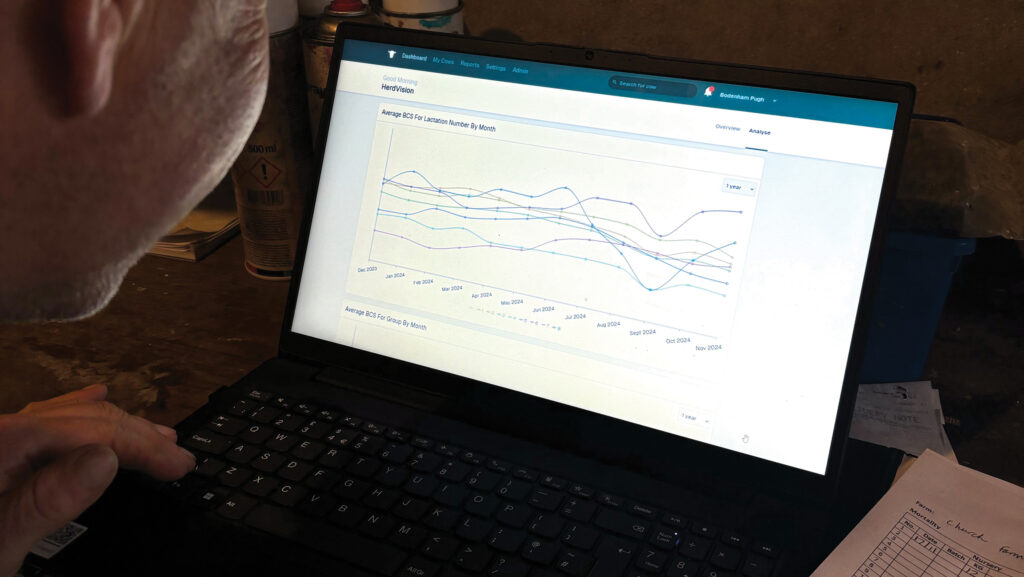
© Agsenze
Agsenze
To improve group feeding precision, Agsenze is adding more functionality to its HerdVision system via the new HerdNutrition module.
The original system is based on an in-shed camera setup which uses 2D and 3D imaging to generate body condition and mobility scores.
Historically, HerdVision has focused on individual cow data, but with the new module, it is now possible to track real-time body condition score trends in groups of cows and heifers.
For instance, cows of a similar calving month or lactation stage/number.
From this, any changes to body condition score data within a group are fed into a new metric designed to enable producers and their nutritionists to adapt diets to match the precise requirements of each group.
This will maximise feed conversion efficiency and replace previous estimations based on diet formulation and management, or environmental factors, explains the firm’s James Vaughan.
He says the benefit to farmers will be a better “data-driven” approach to group feeding, which in turn will improve milk yield, herd health conditions (including fatty liver disease/ketosis) and ultimately herd longevity.
Price: HerdNutrition is free to existing HerdVision users. HerdVision starts from £1,800 a farm.
Contact: James.Vaughan@agsenze.com
4. Youngstock Monitor
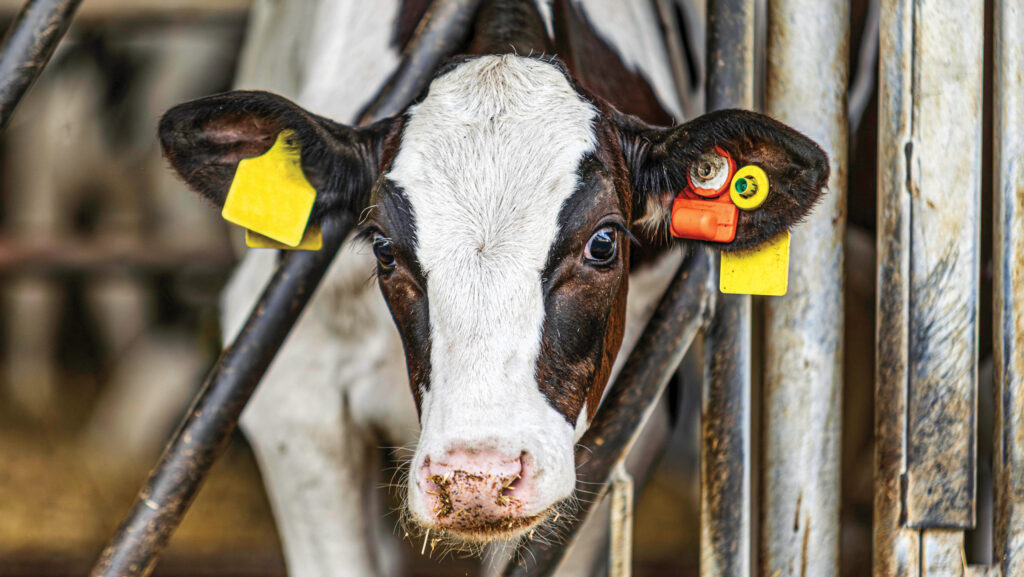
© CowManager
CowManager
While using technology to monitor cows and heifers has become a regular management tool, it is much less common in calves.
In a bid to provide a solution to this, CowManager is launching its Youngstock Monitor system.
This setup is based on ear sensor technology that can track behavioural development and health.
It is powered by artificial intelligence, using algorithms developed by the firm to provide early identification of key calf challenges such as disease and reduced feed intake.
The data are available on a dashboard, which can be accessed via smartphone, or online application.
The software also has the capability to rank insights in terms of severity, for example grading calf health from “suspicious” to “very sick”, which the firm says will enable earlier intervention and therefore improve calf welfare and management.
Once tagged, CowManager says the sensor will last the animal’s lifetime.
Price: Discounts for bulk orders, averages about £1 a month (based on a 200-head herd).
Contact: Ben Nottage, bnottage@wwsires.co.uk
5. Grassland chemistry
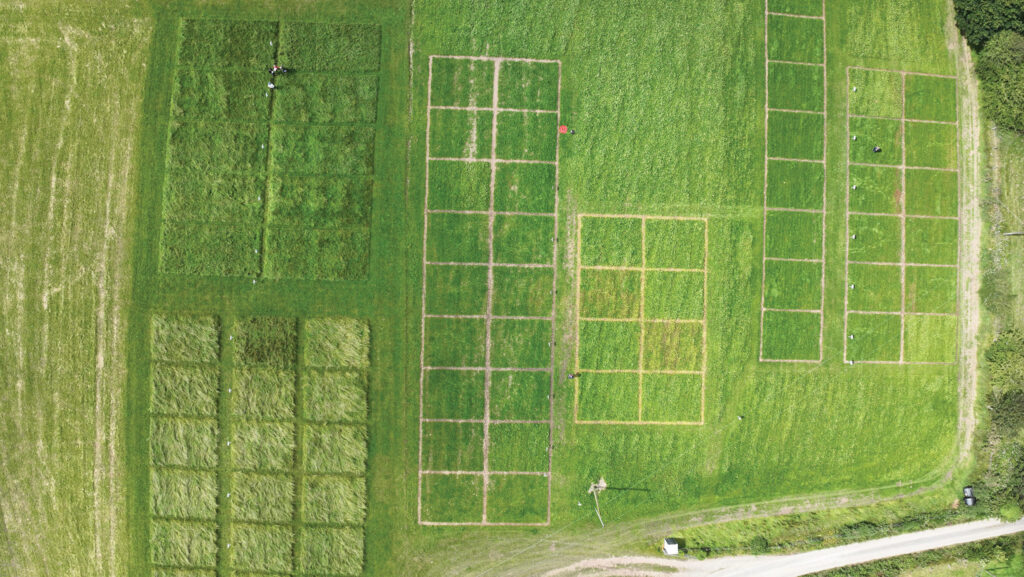
© Corteva
Corteva
One of the key blockers to more clover use in grassland is the lack of a broad-spectrum weed control solution, which Corteva hopes to solve.
It is debuting two new broad-spectrum herbicides – each containing a new active ingredient and designed to enhance weed control in grassland.
First up is clover-safe ProClova XL (currently known as GF-3730 XL due to impending approval), based on the new active Rinskor (florpyrauxifen-benzyl) alongside amidosulfuron.
According to Corteva’s Eddie Bardsley, ProClova XL has been designed to enhance weed control in clover pastures, particularly at establishment, as dairy farmers seek to include more home-grown protein sources in the diet.
Eddie says that the herbicide can control key weeds – such as docks, chickweed, dandelions and hogweed – in both newly sown and established leys, and is safe for both white and red clover when applied the year following establishment.
The second product is the recently approved ProGrass (halauxifen + fluroxypyr + triclopyr), designed to improve quality of grazing or silage by reducing weed levels.
It controls a wide range of weeds, operating within a reduced cutting interval compared with competitors, making it particularly beneficial for growers operating multi-cut systems.
Price: Both products cost roughly £55-£60/ha.
Contact: ukhotline@corteva.com
